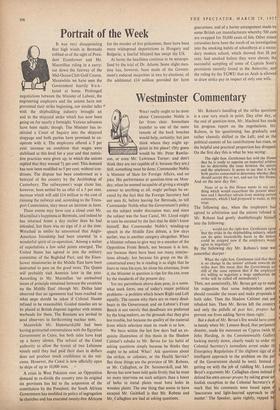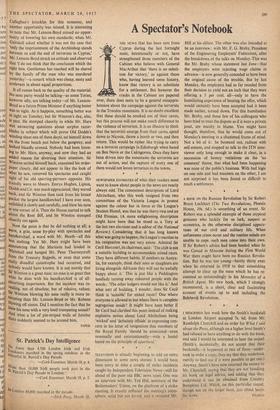Westminster Commentary
WHAT really ought to be done about Commander Noble is far from clear. Immediate transfer to one of the more remote of the back benches would help, certainly; but just think whom they might ap- point in his place! (My guess would be Mr. Peter Rawlin- son, or even Mr. Lawrence Turner; and don't think they are not capable of it, because they are.) Still, something must be done; Commander Noble is Minister of State for Foreign Affairs, and no joke. His performance at question-time on Mon- day, when he seemed incapable of giving a straight answer to anything at all, might perhaps be ex- cused by the fact that the Foreign Secretary had not seen fit, before leaving for Bermuda, to tell Commander Noble what the Government's policy on the subject under discussion was; and since The subject was the Suez Canal, Mr. Lloyd might in turn be excused by the fact that he didn't know himself. But Commander Noble's winding-up speech in the Middle East debate, a few days earlier, was in another category altogether. When a Minister refuses to give way to a member of the Opposition Front Bench, not because it is late, nor because there have been too many interjec- tions already, but because his grasp on the ill- constructed essay he is reading is so slight that he fears to raise his eyes, let alone his attention, from it, the Minister in question is ripe for the axe, even by the standards of the present day.
Yet my parenthesis above does pose, in a some- what stark form, one of today's major political problems—k problem which besets Right and Left equally. The reason why there are so many dead- beats in the Government and on Labour's Front Bench is not merely that deadbeats are preferred by the king-makers, on the grounds that they give less trouble, but because the quality of the material from which selection must be made is so low.
We have within the last few days had an ex- quisite illustration of this thesis in the Shadow Cabinet's rebuke to Mr. Bevan for his habit of asking questions simply because he thinks they ought to be asked. What ! Ask questions about the strikes, or colonies, or the Health Service? But these things are the province of Mr. Robens, or Mr. Callaghan, or Dr. Summerskill, and Mr. Bevan has now been told quite firmly that he must no more intervene on such subjects than a borer of holes in metal plates must bore holes in wooden plates. The one thing that seems to have escaped Mr. Gaitskell is that Mr. Robens and Mr, Callaghan are bad at asking questions. Mr. Robens's handling of the strike questions is a case very much in point. Day after day, at the end of question-time, Mr. Macleod has made his progress report on the negotiations. Mr. Robens, in his questioning, has gradually and rather clumsily shifted to the Left; and as the political content of his contributions has risen, so the helpful and practical proportion has dropped. On the first day this is what he was saying :
The right hon. Gentleman has told the House that he is ready to appoint an impartial arbitra- tor to determine the issue between the unions and the employers. It seems to me that it is for both parties concerned to determine whether they ' should accept this or not, and not for this House.
And on the next day this :
None of us in this House wants to say any- thing which would exacerbate the present situa- , tion and I therefore refrain from making certain comments, which 1 had proposed to make, at this stage.
The following day, when the employers had i agreed to arbitration and the unions refused it. Mr. Robens had gently doublethought himself into the following : . . would not the right hon. Gentleman agree that the strike in the shipbuilding industry, which , can do quite incalculable harm to the nation, ' could be stopped now if the employers would agree to negotiate?
By the following day Mr. Robens's tone was
somewhat sharper : When the right hon. Gentleman said that there is no change in the unions' attitude towards the strike does this mean that the Government are still of the same opinion that if the employers are willing to negotiate a wage application the strike will be called off immediately?
Then, not unnaturally, Mr. Bevan got up to make. his suggestion that some independent persot should consider the issues and make proposals to both sides. Then the Shadow Cabinet met and t rebuked him. Then Mr. Bevan left the country, I and only the pitfalls of post hoc, propter true l prevent me from adding 'Serve theth right.' 1 But a dash of Mr. Bevan's fire would have come 1 in handy when Mr. Lennox-Boyd, that peripatetic disaster, made his statement on Cyprus (with Si', John Harding, in the Comnionwealth Gallery, looking sternly down, clearly ready to order the, Colonial Secretary's immediate arrest under th‘ Emergency Regulations if the slightest sign of at I intelligent approach to the problem on the pat c of the Government should be seen). Instead getting on with the job of riddling Mr. Lennox' Boyd's arguments Mr. Callaghan chose instead Ic defend his own amour-propre by taking great and, foolish exception to the Colonial Secretary's rt mark that his comments were based upon or `inaccurate and light-hearted approach to tlo' matter.' The Speaker, quite rightly, rapped Mr Callaghan's knuckles for this nonsense, and by another opportunity was missed. It is interesting ::arsi to note that Mr. Lennox-Boyd missed no oppor- nor i tunity of lowering his own standards; when Mr. :ion Gaitskell asked whether it was not the case that on- 'only the imprisonment of the Archbishop stands per between us and the end of terrorism in Cyprus,' the Mr. Lennox-Boyd struck an attitude and observed nt'3 that 'I do not think that the conclusion which the and right hon. Gentleman has reached will be shared Ned by the family of the man who was murdered yesterday'—a remark which was cheap, nasty and irrelevant in about equal proportions.
It all comes back to the quality of the material. No sane party would be talking—as some Tories, however idly, are talking today—of Mr. Lennox- 1 Boyd as a future Prime Minister if anything better ons , was in sight. As it happens, something better was , at in sight on Tuesday; but Sir Winston's day, alas, adei is past. He stumped cheerily in while Mr. Hare Mr.' was answering questions about surplus razor- And blades (a subject which will prove Old Dodds's the winding-sheet one of these days), sat himself down on the front bench just below the gangway, and looked blandly around. Nobody had been listen- ing to Mr. Hare, anyway, and now they had an added reason for diverting their attention. Sir Winston settled himself back, examined his order- paper closely, did not appear to like the look of what he saw, removed his spectacles and caught sight of his old sparring-partners opposite. His friendly wave to Messrs. Emrys Hughes, Lipton, Dodds and Co. was much appreciated; they waved back, and Sir Winston then took from his breast pocket the largest handkerchief 1 have ever seen, unfolded it slowly and carefully, and blew his nose in one corner of it. Then the House started to talk about the Rent Bill, and Sir Winston stumped cheerily out again.
Now the point is that he did nothing at all; a wave, a grin, some by-play with spectacles and handkerchief, a word with Mr. Heath—all this Was nothing. Yet Mr. Hare might have been was announcing that the Martians had landed in Whitehall and hanged Mr. Peter Thorneycroft from the Treasury flagpole, or even that some really dreadful catastrophe had occurred, and nobody would have known. It is not merely that Sir Winston is a great man; no man is so great that What he does with his handkerchief is of all- absorbing importance. But the incident was re- vealing, not of absolute, but of relative, values; Sir Winston blowing his nose really is more in- teresting than Mr. Lennox-Boyd or Mr. Robens blew off steam. Did I mention the fact that he blew his nose with a very loud trumpeting sound? And what a lot of pin-striped walls of Jericho there suddenly seemed to be around him.
TAPER



































 Previous page
Previous page